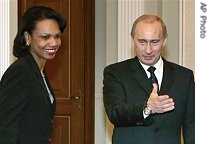2007年VOA标准英语-Rice, Putin Agree to Disagree, Respectfully(在线收听)
Moscow
15 May 2007
U.S. Secretary of State Condoleezza Rice and Russian President Vladimir Putin have agreed to ease tensions and tone down harsh rhetoric, but after two days of extensive talks in Moscow, stark differences remain over missile defense and Kosovo. VOA's Lisa McAdams in Moscow has details.
 |
| Vladimir Putin invites Condoleezza Rice for talks at his Novo-Ogaryovo country residence west of Moscow in this 15 Oct 2005 file photo |
She says the U.S. is committed to working with Russia in order to lessen Moscow's concerns that the system poses a risk to its national security. At the same time, Rice was firm on Washington's right to develop such a system to defend itself and Europe, including Russia.
"I don't think anyone expects the United States to permit somehow a veto on American security interests," she said. "But we want to do it in a cooperative way, we want to do it in a collaborative way. And the best way to do it, would be to do it in a more formal, structured cooperation."
Rice says the U.S. plans to better share with Russia the long-range plans for missile defense. Washington says the missile shield, to be deployed in Poland and the Czech Republic, will protect the U.S. and its allies from missile attacks from Iran.
Russian officials continue to express concern that the system could later expand further into Central and Eastern Europe. Russian Foreign Minister Sergei Lavrov, who participated in the talks, characterized the exchange as candid and friendly, but he said Moscow's stance on missile defense is unchanged.
On Kosovo, where there were greater hopes for a possible breakthrough, there was also little sign of progress. Russia has expressed reluctance to support a United Nations plan granting supervised independence to Serbia's breakaway province.
Despite the failure to remove key stumbling blocks, Rice told reporters she is upbeat about the state of U.S.-Russian relations.
"I don't want the considerable degree of cooperation that we have on a number of issues to be lost," she said. "It's one reason that the overheated rhetoric is particularly damaging because it obscures the fact that on some of the most sensitive issues that one can imagine - non-proliferation, nuclear terrorism, the fight against terrorism, information and intelligence-sharing-work together on Iran or on North Korea - that we have good relations."
Rice also said she hopes the U.S. has seen the last of harsh attacks, like the one President Putin launched during a major foreign policy speech earlier this year in Germany, where he accused the United States of making the world a more dangerous place.
But the Russian press was pessimistic. One newspaper, Vremya Novostei, wrote that the tensions do not bode well for President Putin's encounter next month with President Bush at the G-8 Summit in Germany.
German Foreign Minister Frank-Walter Steinmeier, whose country holds the EU presidency, was also in Russia Tuesday on a last minute visit to discuss what is expected to be a contentious EU-Russia Summit in the city of Samara later this week.
Steinmeier said both sides must acknowledge their concerns and discuss them, rather than turn away from conflict. President Putin acknowledged there are problems, but played down their severity.